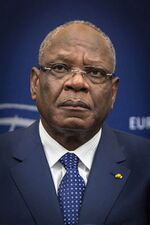President of Toloria: Difference between revisions
| Line 69: | Line 69: | ||
===Nominations=== | ===Nominations=== | ||
The President is highly active in appointing top officials in the country. He appoints candidates for official state positions, who, ceremoniously, must be approved based on parliamentary vote. However, the President has the power to override any veto of a nomination. The President submits nominations to the People's Assembly for judges of the Constitutional Court and the Supreme Court, as well as for Prosecutor General of Toloria. A proposal to relieve the Prosecutor General of his duties must also be submitted to the People's Assembly. The President also submits nominations to the People's Assembly for appointment to the office of the Chairman of the Central Bank, and likewise submits any proposal to relieve the Chairman of the Central Bank of his duties. | |||
===Legislation=== | ===Legislation=== | ||
===Foreign policy=== | ===Foreign policy=== | ||
Revision as of 01:49, 6 December 2019
| President of the Union of Toloria | |
|---|---|
 Flag of the Union of Toloria | |
| |
| Style |
|
| Status | Head of State |
| Abbreviation | POTU, POT |
| Nominator | Political parties or self-nomination |
| Appointer | Direct popular vote |
| Term length | 5 years |
| Constituting instrument | Tolorian Constitution |
| Deputy | Prime Minister of Toloria |
The President of Toloria, officially the President of the Union of Toloria (Native: UMongämeli kwê inyuňyaņa ye Tǒlorïa), is the head of state of the Union of Toloria, as well as the commander-in-chief of the Tolorian Armed Forces. He holds the highest office in Toloria.
The power includes execution of federal law, alongside the responsibility of appointing federal ministers, diplomatic, regulatory and judicial officers, and concluding treaties with foreign powers with the advice and consent of the People's Assembly. The president is further empowered to grant federal pardons and reprieves, and to convene and adjourn the People's Assembly under extraordinary circumstances. The president also directs the foreign and domestic policy of the Union of Toloria.
Selection Process
Eligibility
A candidate for President of Toloria must be 35 years of age, a domestic born citizen, and a resident of the country for 15 years prior to being a candidate. Upon the original writing of the Constitution, presidential term limits were no more than 2 consecutive terms for an incumbent. As of 1987, there are no longer any term limits for the office of President of the Union of Toloria. Any sitting president may continue to serve as long as he is re-elected.
Election
Inauguration
Inauguration of the President of Toloria is conducted five years after the previous inauguration. If the individual is an acting President, he takes the oath a week after the announcement of his appointment. Before executing the powers of the office, a president is constitutionally required to take the presidential oath:
I swear in exercising the powers of the President of the Union of Toloria to respect and defend the sanctity of this office and the rights and freedoms of man and citizen, to observe and protect the Constitution of the Union of Toloria, to protect the sovereignty and independence, security and integrity of the State, to defend the State against foreign and domestic enemies, and to faithfully serve the people.
Vacancy or disability
Insignia
Powers and Duties
Guarantor of the Constitution
As the guarantor of the Constitution and the entire system of constitutional law, the President ensures that the constitutions, laws and regulations of the outlined territories of the Union of Toloria are exercised in full compliance with the country's Constitution and federal laws.
Nominations
The President is highly active in appointing top officials in the country. He appoints candidates for official state positions, who, ceremoniously, must be approved based on parliamentary vote. However, the President has the power to override any veto of a nomination. The President submits nominations to the People's Assembly for judges of the Constitutional Court and the Supreme Court, as well as for Prosecutor General of Toloria. A proposal to relieve the Prosecutor General of his duties must also be submitted to the People's Assembly. The President also submits nominations to the People's Assembly for appointment to the office of the Chairman of the Central Bank, and likewise submits any proposal to relieve the Chairman of the Central Bank of his duties.
